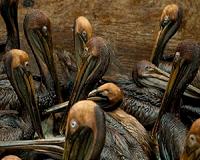| . |  |
. |
Fort Jackson, Louisiana (AFP) June 10, 2010 Most oil-struck birds and turtles will die alone and uncounted for at sea or buried in coastal wetlands, amid warnings the true toll from the Gulf of Mexico spill may never be known. "Historically, they estimate that 10 percent of (oiled) birds are found," said Rebecca Dunne, of Tri-State Bird Rescue & Research. "Others sink or they're scavenged." Some 1,075 birds -- 633 of which were dead -- have been recovered in the 50 days since the BP-leased Deepwater Horizon rig sank spectacularly some 52 miles (84 kilometers) off the coast of Louisiana. It took weeks for the massive, undulating slick to reach shore and nearly half of those birds have been found in the past 10 days. Complicating rescue and recovery efforts are the sheer size of the slick and the fact that so much of it remains offshore. Dead birds sink in a matter of days. Oiled turtles and dolphins rarely end up on beaches. Add to that the long-term impact from giant plumes of oil floating deep in the water column and a massive quantity of chemical dispersants that multiply toxicity levels. Most experts agree the chemical dispersants are needed to keep as much oil as possible out of fragile coastal wetlands, but others have expressed concern they could do more harm than damage to marine wildlife. "The problem with that is there's very little research out there on the effects of oil on the water column and on bottom habitats," Natural Resources Defense Council marine biologist Lisa Suatoni said in a recent interview. "So while we think it's the least bad place, we don't really know." The impact will depend on where the oil is concentrated. The upper layer of the water column is teeming with life. It's filled with extremely sensitive invertebrates and fish larvae. Those that are not immediately killed will likely have lower reproductive rates and life spans. They could also sicken the larger fish that feed off them, Suatoni said. If the oil settles on shallower shelves, it will damage important habitats like coral reefs, which can have a lasting impact on survival and reproduction rates for years to come. The middle of the water column would be "the least bad place" for the oil to settle, but it can still impact the marine life traveling through like sharks and whales, according to Suatoni. The coastal wetlands are the absolute worst place for the oil to go because it is impossible to protect every inlet in the massive maze of marshes. Once the oil gets in, it's incredibly difficult to remove. And even a small storm can create a surge that will push the oil deeper and deeper into the marsh. The wetlands are teeming with birds and provide critical breeding grounds for shrimp, crab, fish, turtles and other marine animals. Rescue crews can only use flat-bottomed boats to search for oiled birds in the shallow waters, and the marsh gives frightened animals plenty of places to hide, hampering efforts to catch them. Most of the 400 or so birds at the rehabilitation center in Fort Jackson on Wednesday were pelicans. They huddled together in wooden pens blinking under the heavy brown gunk that distorts their feathers, waddling over occasionally to grab a small fish out of a rubber bin. "The lucky thing for me as a responder is this oil is thick, so the birds can't fly, so they're easy to catch," said Dunne, who manages the ever-expanding operation. The pelicans are sturdy social birds that fare much better in captivity than plovers and more delicate little shore birds. About 90 percent of the large birds have survived the extremely stressful capture and cleaning process: it takes about 45 minutes to wash the oil off their feathers with dish soap and several days of preening to recover their waterproofing. "Generally these are healthy birds who were in the wrong spot at the wrong time," Dunne said. The birds that arrive badly injured are euthanized. With so many birds coming in and so many more expected, there simply is no time to try to save them.
Share This Article With Planet Earth
Related Links Our Polluted World and Cleaning It Up
 Gulf oil spill sickens more than 70 people in Louisiana
Gulf oil spill sickens more than 70 people in LouisianaWashington (AFP) June 9, 2010 Seventy-one people in Louisiana have suffered health problems that officials believe are linked to the oil spill in the Gulf of Mexico, the state's department of health and hospitals said Wednesday. Fifty of those who have reported symptoms including throat irritation, cough, shortness of breath, eye irritation, nausea, chest pain and headaches, worked on oil rigs or were part of the effort ... read more |
|
| The content herein, unless otherwise known to be public domain, are Copyright 1995-2010 - SpaceDaily. AFP and UPI Wire Stories are copyright Agence France-Presse and United Press International. ESA Portal Reports are copyright European Space Agency. All NASA sourced material is public domain. Additional copyrights may apply in whole or part to other bona fide parties. Advertising does not imply endorsement,agreement or approval of any opinions, statements or information provided by SpaceDaily on any Web page published or hosted by SpaceDaily. Privacy Statement |